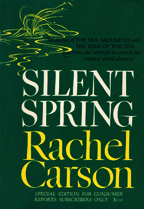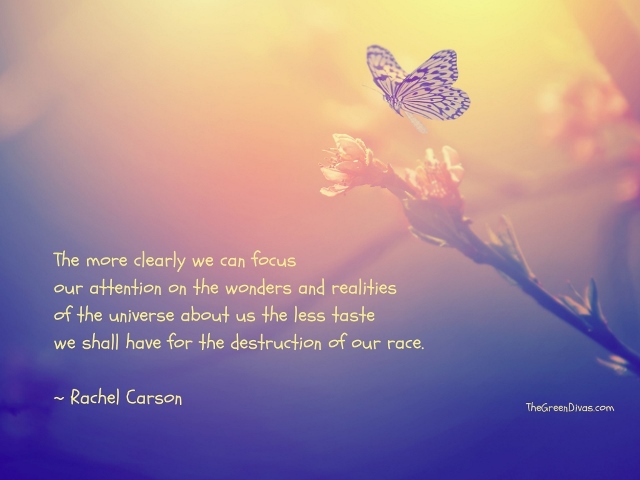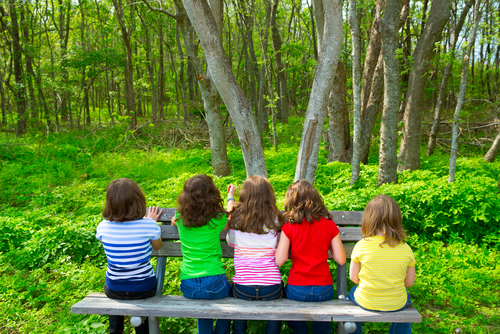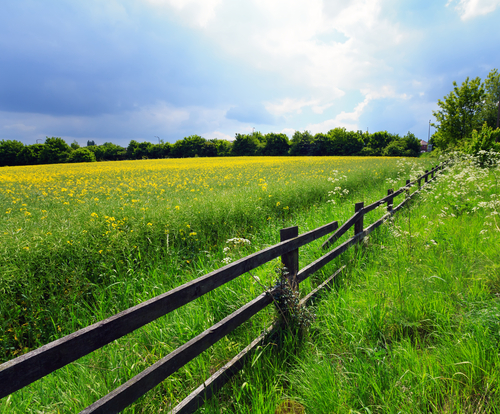Rachel Carson, born in 1907, was a green diva long before green divas were cool.
In 1962, she authored the best-selling book Silent Spring—an exposé of the chemical industry and pesticides like DDT. 
In 1963, she stood before Congress and made a statement about the environmental hazards of pesticides and other chemical poisons, which you can read in full here.
Today’s Google even dedicated their doodle to her! Further proof that she was truly an environmental pioneer.
In celebration of her birthday, I’ve selected 20 Rachel Carson quotes:
1. But man is a part of nature, and his war against nature is inevitably a war against himself.
2. In nature nothing exists alone.
3. When we review the history of mankind in relation to the earth we cannot help feeling somewhat discouraged, for that history is for the most part that of the blind or short-sighted despoiling of the soil, forests, waters and all the rest of the earth’s resources.
4. It is also an era dominated by industry, in which the right to make a dollar at whatever cost is seldom challenged.
5. It is a curious situation that the sea, from which life first arose should now be threatened by the activities of one form of that life. But the sea, though changed in a sinister way, will continue to exist; the threat is rather to life itself.
6. Nature has introduced great variety into the landscape, but man has displayed a passion for simplifying it. Thus he undoes the built-in checks and balances by which nature holds the species within bounds.
7. In every outthrust headland, in every curving beach, in every grain of sand there is the story of the earth.
8. Only within the moment of time represented by the present century has one species—man—acquired significant power to alter the nature of the world.
9. If a child is to keep alive his inborn sense of wonder, he needs the companionship of at least one adult who can share it, rediscovering with him the joy, excitement, and mystery of the world we live in.
10. Those who contemplate the beauty of the earth find reserves of strength that will endure as long as life lasts. There is something infinitely healing in the repeated refrains of nature — the assurance that dawn comes after night, and spring after winter.
11. Those who contemplate the beauty of the earth find reserves of strength that will endure as long as life lasts.
12. One way to open your eyes is to ask yourself, “What if I had never seen this before? What if I knew I would never see it again?”
13. Those who dwell, as scientists or laymen, among the beauties and mysteries of the earth, are never alone or weary of life.
14. The question is whether any civilization can wage relentless war on life without destroying itself, and without losing the right to be called civilized.
15. It is a wholesome and necessary thing for us to turn again to the earth and in the contemplation of her beauties to know the sense of wonder and humility.
16. The more clearly we can focus our attention on the wonders and realities of the universe about us the less taste we shall have for the destruction of our race. Wonder and humility are wholesome emotions, and they do not exist side by side with a lust for destruction.
17. A Who’s Who of pesticides is therefore of concern to us all. If we are going to live so intimately with these chemicals eating and drinking them, taking them into the very marrow of our bones—we had better know something about their nature and their power.
18. Why should we tolerate a diet of weak poisons, a home in insipid surroundings, a circle of acquaintances who are not quite our enemies, the noise of motors with just enough relief to prevent insanity? Who would want to live in a world which is just not quite fatal?
19. We stand now where two roads diverge. But unlike the roads in Robert Frost’s familiar poem, they are not equally fair. The road we have long been traveling is deceptively easy, a smooth superhighway on which we progress with great speed, but at its end lies disaster. The other fork of the road — the one less traveled by — offers our last, our only chance to reach a destination that assures the preservation of the earth.
20. How could intelligent beings seek to control a few unwanted species by a method that contaminated the entire environment and brought the threat of disease and death even to their own kind.
For more information about Rachel Carson, visit rachelcarson.org.
Images via shutterstock.
Bonus:
Listen to this Green Divas Radio Show. which features Susan Freinkel talking about how pesticides impact our children.




types of philes
January 22, 2017 at 5:14 am
Thanks for the great quotes it was great reading your blog . It is really awesome. no 7, 14and 20 is really great one It is really wonderful message and saying. I love quotes and saying books is what I study , I do collect good words that I like, and you have something good too I will use it on my blog too thanks! a lot
Pingback: Top 20 Rachel Carson Quotes to Celebrate This Eco Heroine’s 107th Birthday - Eco Save Earth